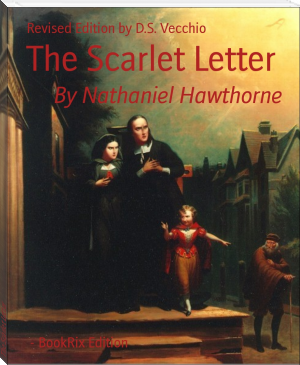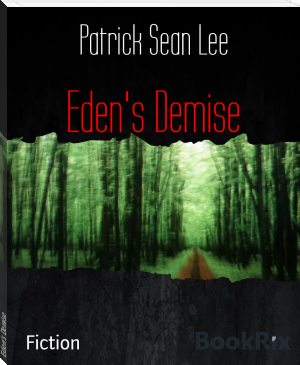The Scarlet Letter - Revised Edition by D.S. Vecchio (cat reading book .TXT) 📗

- Author: Revised Edition by D.S. Vecchio
Book online «The Scarlet Letter - Revised Edition by D.S. Vecchio (cat reading book .TXT) 📗». Author Revised Edition by D.S. Vecchio
INSPECTOR
The father of the Custom House--the patriarch, not only of this little squad of officials, but, I am bold to say, of the respectable body of tide-waiters all over the United States—was a certain permanent Inspector. He might truly be termed a legitimate son of the revenue system, dyed in the wool, or rather born in the purple; since his sire, a Revolutionary colonel, and formerly collector of the port, had created an office for him and appointed him to fill it at a period of the early ages which few living men can now remember. This Inspector, when I first knew him, was a man of fourscore years, or thereabouts, and certainly one of the most wonderful specimens of winter-green that you would be likely to discover in a lifetime's search. With his florid cheek, his compact figure smartly arrayed in a bright-buttoned blue coat, his brisk and vigorous step, and his hale and hearty aspect, altogether he seemed--not young, indeed--but a kind of new contrivance of Mother Nature in the shape of man, whom age and infirmity had no business to touch. His voice and laugh, which perpetually re-echoed through the Custom House, had nothing of the tremulous quaver and cackle of an old man's utterance; they came strutting out of his lungs, like the crow of a cock, or the blast of a clarion. Looking at him merely as an animal--and there was very little else to look at--he was a most satisfactory object, from the thorough healthfulness and wholesomeness of his system, and his capacity, at that extreme age, to enjoy all, or nearly all, the delights which he had ever aimed at or conceived of. The careless security of his life in the Custom House, on a regular income, and with but slight and infrequent apprehensions of removal, had no doubt contributed to make time pass lightly over him. The original and more potent causes, however, lay in the rare perfection of his animal nature, the moderate proportion of intellect, and the very trifling admixture of moral and spiritual ingredients; these latter qualities, indeed, being in barely enough measure to keep the old gentleman from walking on all-fours. He possessed no power of thought, no depth of feeling, no troublesome sensibilities: nothing, in short, but a few commonplace instincts, which, aided by the cheerful temper which grew inevitably out of his physical well-being, did duty very respectably, and to general acceptance, in lieu of a heart. He had been the husband of three wives, all long since dead; the father of twenty children, most of whom, at every age of childhood or maturity, had likewise returned to dust. Here, one would suppose, might have been sorrow enough to imbue the sunniest disposition through and through with a sable tinge. Not so with our old Inspector. One brief sigh sufficed to carry off the entire burden of these dismal reminiscences. The next moment he was as ready for sport as any un-breeched infant: far readier than the Collector's junior clerk, who at nineteen years was much the elder and graver man of the two.
I used to watch and study this patriarchal personage with, I think, livelier curiosity than any other form of humanity there presented to my notice. He was, in truth, a rare phenomenon; so perfect, in one point of view; so shallow, so delusive, so impalpable such an absolute nonentity, in every other. My conclusion was that he had no soul, no heart, no mind; nothing, as I have already said, but instincts; and yet, withal, so cunningly had the few materials of his character been put together that there was no painful perception of deficiency, but, on my part, an entire contentment with what I found in him. It might be difficult--and it was so--to conceive how he should exist hereafter, so earthly and sensuous did he seem; but surely his existence here, admitting that it was to terminate with his last breath, had been not unkindly given; with no higher moral responsibilities than the beasts of the field, but with a larger scope of enjoyment than theirs, and with all their blessed immunity from the dreariness and duskiness of age. One point in which he had vastly the advantage over his four-footed brethren was his ability to recollect the good dinners which it had made no small portion of the happiness of his life to eat. His gourmandism was a highly agreeable trait; and to hear him talk of roast meat was as appetizing as a pickle or an oyster. As he possessed no higher attribute, and neither sacrificed nor vitiated any spiritual endowment by devoting all his energies and ingenuities to subserve the delight and profit of his maw, it always pleased and satisfied me to hear him expatiate on fish, poultry, and butcher's meat, and the most eligible methods of preparing them for the table. His reminiscences of good cheer, however ancient the date of the actual banquet, seemed to bring the savor of pig or turkey under one's very nostrils. There were flavors on his palate that had lingered there not less than sixty or seventy years, and were still apparently as fresh as that of the mutton chop which he had just devoured for his breakfast. I have heard him smack his lips over dinners, every guest at which, except himself, had long been food for worms. It was marvelous to observe how the ghosts of bygone meals were continually rising up before him--not in anger or retribution, but as if grateful for his former appreciation, and seeking to reduplicate an endless series of enjoyment, at once shadowy and sensual: a tenderloin of beef, a hind-quarter of veal, a spare-rib of pork, a particular chicken, or a remarkably praiseworthy turkey, which had perhaps adorned his board in the days of the elder Adams, would be remembered; while all the subsequent experience of our race, and all the events that brightened or darkened his individual career, had gone over him with as little permanent effect as the passing breeze. The chief tragic event of the old man's life, so far as I could judge, was his mishap with a certain goose, which lived and died some twenty or forty years ago: a goose of most promising figure, but which, at table, proved so inveterately tough, that the carving-knife would make no impression on its carcase, and it could only be divided with an ax and handsaw.
But it is time to quit this sketch; on which, however, I should be glad to dwell at considerably more length, because of all men whom I have ever known, this individual was fittest to be a Custom House officer. Most persons, owing to causes which I may not have space to hint at, suffer moral detriment from this peculiar mode of life. The old Inspector was incapable of it; and, were he to continue in office to the end of time, would be just as good as he was then, and sit down to dinner with just as good an appetite.
COLLECTOR
There is one likeness, without which my gallery of Custom House portraits would be strangely incomplete, but which my comparatively few opportunities for observation enable me to sketch only in the merest outline. It is that of the Collector, our gallant old General, who, after his brilliant military service, subsequently to which he had ruled over a wild Western territory, had come hither, twenty years before, to spend the decline of his varied and honorable life.
The brave soldier had already numbered, nearly or quite, his three-score years and ten, and was pursuing the remainder of his earthly march, burdened with infirmities which even the martial music of his own spirit-stirring recollections could do little towards lightening. The step was palsied now, that had been foremost in the charge. It was only with the assistance of a servant, and by leaning his hand heavily on the iron balustrade, that he could slowly and painfully ascend the Custom House steps, and, with a toilsome progress across the floor, attain his customary chair beside the fireplace. There he used to sit, gazing with a somewhat dim serenity of aspect at the figures that came and went, amid the rustle of papers, the administering of oaths, the discussion of business, and the casual talk of the office; all which sounds and circumstances seemed but indistinctly to impress his senses, and hardly to make their way into his inner sphere of contemplation. His countenance, in this repose, was mild and kindly. If his notice was sought, an expression of courtesy and interest gleamed out upon his features, proving that there was light within him, and that it was only the outward medium of the intellectual lamp that obstructed the rays in their passage. The closer you penetrated to the substance of his mind, the sounder it appeared. When no longer called upon to speak or listen--either of which operations cost him an evident effort--his face would briefly subside into its former not uncheerful quietude. It was not painful to behold this look; for, though dim, it had not the imbecility of decaying age. The framework of his nature, originally strong and massive, was not yet crumpled into ruin. To observe and define his character, however, under such disadvantages, was as difficult a task as to trace out and build up anew, in imagination, an old fortress, like Ticonderoga, from a view of its gray and broken ruins. Here and there, perchance, the walls may remain almost complete; but elsewhere may be only a shapeless mound, cumbrous with its very strength, and overgrown, through long years of peace and neglect, with grass and alien weeds.
Nevertheless, looking at the old warrior with affection – for, slight as was the communication between us, my feeling towards him, like that of all bipeds and quadrupeds who knew him, might not improperly be termed so – I could discern the main points of his portrait. It was marked with the noble and heroic qualities which showed it to be not a mere accident, but of good right, that he had won a distinguished name. His spirit could never, I conceive, have been characterized by an uneasy activity; it must, at any period of his life, have required an impulse to set him in motion; but once stirred up, with obstacles to overcome, and an adequate object to be attained, it was not in the man to give out or fail. The heat that had formerly pervaded his nature, and which was not yet extinct, was never of the kind that flashes and flickers in a blaze; but rather a deep red glow, as of iron in a furnace. Weight, solidity, firmness—this was the expression of his repose, even in such decay as had crept untimely over him at the period of which I speak. But I could imagine, even





Comments (0)